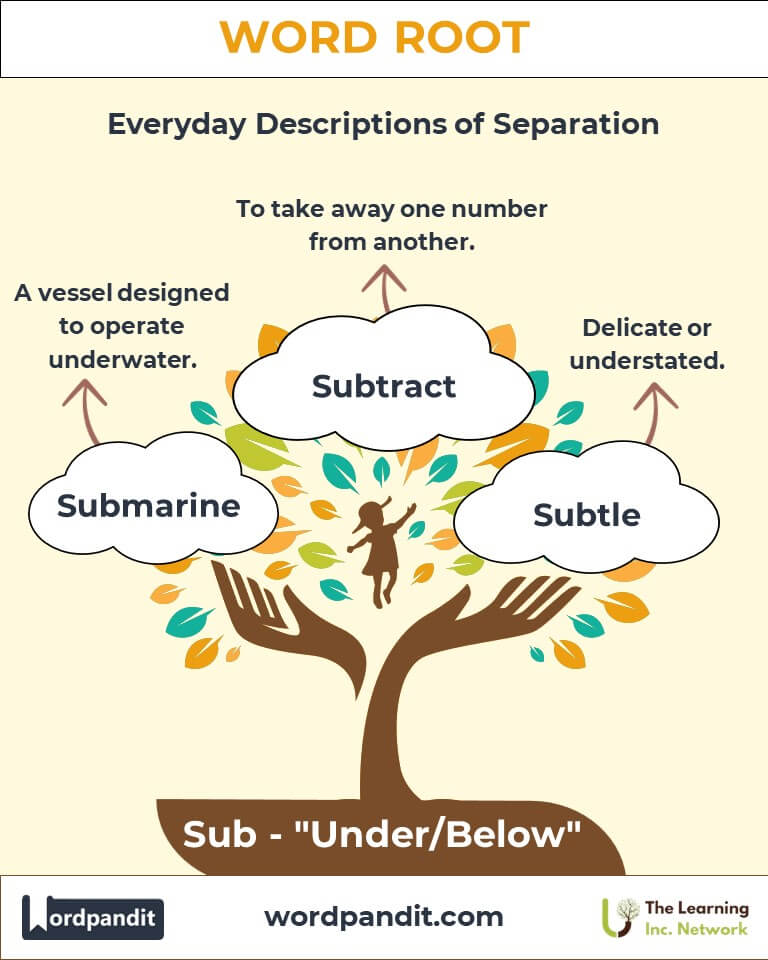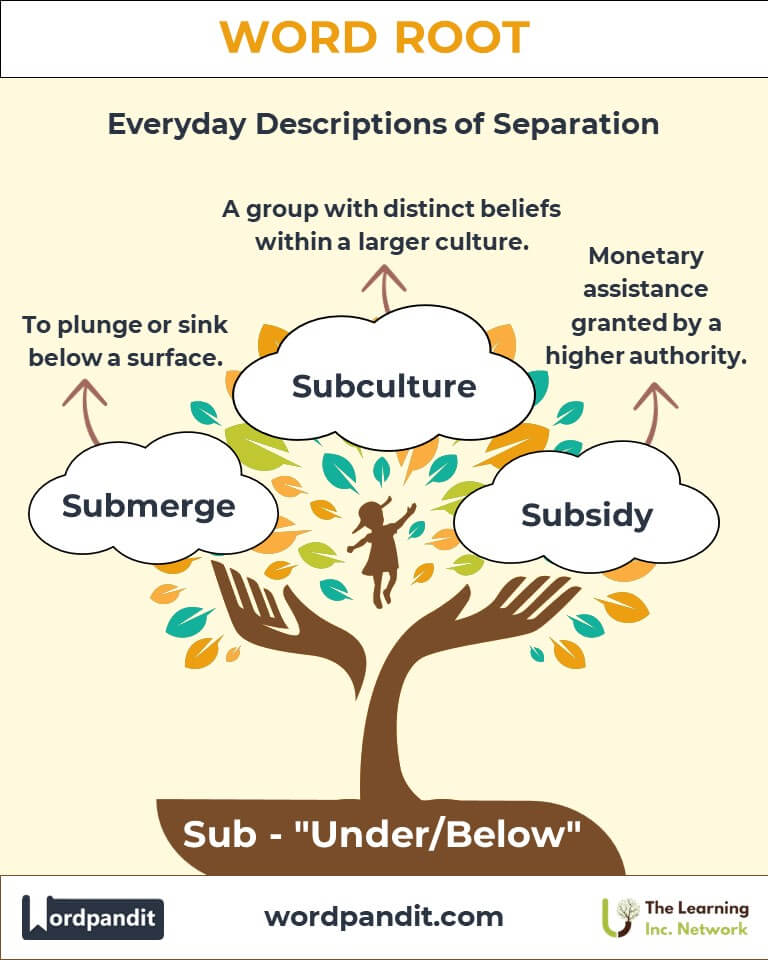Sub: Exploring the Depths of "Under" Across Language and Meaning
Discover the versatility of the root "Sub," derived from Latin, meaning "under" or "below." From words like "submarine" to "subtract," this root has enriched language by emphasizing position, reduction, and support in diverse contexts.

Table of Contents
- Introduction: The Power of "Sub"
- Etymology and Historical Journey
- Mnemonic: Unlocking the Power of "Sub"
- Common "Sub"-Related Terms
- "Sub" Through Time
- "Sub" in Specialized Fields
- Illustrative Story: "Sub" in Action
- Cultural Significance of "Sub"
- The "Sub" Family Tree
- FAQs About the "Sub" Word Root
- Test Your Knowledge: "Sub" Word Root Quiz
- Conclusion: The Living Legacy of "Sub"
1. Introduction: The Power of "Sub"
Imagine the vast ocean depths, where submarines glide silently, or the precise action of subtracting numbers. The root "Sub," pronounced as suhb, has shaped words that describe being beneath, below, or under. Its applications range from nautical adventures to mathematical operations, proving its foundational role in English vocabulary.

2. Etymology and Historical Journey
The root "Sub" comes from Latin, meaning "under" or "below." It evolved through Old French into English, maintaining its core meaning. Historically, "sub" formed the basis for terms describing physical position (e.g., submarine), authority (subordinate), or reduction (subtract). The Industrial Revolution and advances in science expanded its usage, particularly in technology and engineering.
3. Mnemonic: Unlocking the Power of "Sub"
Picture a submarine navigating underwater while a math problem subtracts two numbers above it.
Mnemonic Device:
"Sub dives below—whether it’s a submarine under the sea or subtracting from what you see!"
4. Common "Sub"-Related Terms
- Submarine (suhb-muh-reen)
Definition: A vessel designed to operate underwater.
Example: "The submarine explored the ocean's deepest trenches." - Subtract (suhb-trakt)
Definition: To take away one number from another.
Example: "To find the total, subtract the expenses from the income." - Subtle (suht-l)
Definition: Delicate or understated.
Example: "Her subtle smile hinted at her true feelings." - Submerge (suhb-murj)
Definition: To plunge or sink below a surface.
Example: "The diver submerged into the clear waters of the lake." - Subdivision (suhb-di-vizh-uhn)
Definition: A smaller part of something larger.
Example: "The new housing subdivision was built on the outskirts of the city."
5. "Sub" Through Time
- Subsidy (Historical): Originating in the 14th century, it referred to monetary assistance granted by a higher authority.
- Subaltern (Historic to Modern): Initially used in military contexts, it now symbolizes a lower rank or position in various domains.
6. "Sub" in Specialized Fields
Marine Technology
Submersible: A smaller, specialized underwater craft.
Application: Used for deep-sea exploration.
Mathematics
Subtraction: Fundamental to arithmetic and algebra.
Example: Essential in understanding basic operations and advanced equations.
Sociology
Subculture: A group with distinct beliefs or practices within a larger culture.
Relevance: Highlights diversity within societies.
7. Illustrative Story: "Sub" in Action
Captain Elena piloted her submarine into uncharted waters, exploring an underwater cave. As she submerged deeper, she remembered how subtraction helped her navigate precisely—calculating distances and oxygen supply. Her team's discovery of a new species underscored the importance of exploring what lies beneath, whether in the sea or in knowledge.
8. Cultural Significance of "Sub"
The root "Sub" signifies humility, support, and complexity. Subtle expressions in art, subplots in literature, and subcultures in society all reflect layers beneath the surface. In many traditions, the idea of "under" embodies foundational strength and unseen potential.

9. The "Sub" Family Tree
- Sup/Sus (Variation of "Sub"):
- Support: To hold up.
- Sustain: To keep going.
- Hypo (Greek Equivalent):
- Hypodermic: Under the skin.
- Hypothesis: An underlying assumption.
- Infra (Latin Equivalent):
- Infrastructure: Underlying framework or system.

10. FAQs About the Word Root "Struct"
Q: What does "struct" mean?
A: Struct originates from the Latin struere, meaning "to build" or "to arrange." This root is central to many words related to construction, organization, and systems.
Q: How does "construct" differ from "structure"?
A: Construct refers to the act of building or creating something, while structure describes the finished framework or arrangement of parts. For example, you construct a bridge, and the result is its structure.
Q: What does "destruction" mean, and how is it related to "struct"?
A: Destruction refers to the act of tearing down or ruining something. It combines the prefix de- (meaning "down" or "undo") with struct to signify the dismantling of a built system or object.
Q: What is "infrastructure"?
A: Infrastructure refers to the foundational systems or frameworks that support a society or organization, such as roads, utilities, and communication networks. It highlights how struct applies to large-scale societal "building blocks."
Q: What is "obstruction," and how does it relate to building?
A: Obstruction means something that blocks or impedes progress. In a construction or organizational context, it refers to a hindrance preventing smooth functioning or movement.
Q: Why is "instruction" connected to the root struct?
A: Instruction derives from the idea of "building knowledge." It involves providing guidance or steps that help construct understanding, similar to how physical instructions help assemble objects.
Q: What are some specialized fields where struct is used?
A: Fields like engineering (infrastructure), education (instruction), medicine (obstruction), and psychology (construct) heavily rely on words derived from struct. Each application ties back to the concept of organizing or building systems.
11. Test Your Knowledge: Struct Mastery Quiz
1. What does the root "struct" signify?
2. Which word refers to societal systems like roads and utilities?
3. What does "construct" mean?
4. What is "destruction"?
5. What is obstruction in medicine?
12. Conclusion: The Living Legacy of "Sub"
The root "Sub" continues to underpin words that explore depths, reduction, and layers beneath the surface. Its adaptability across fields like marine technology, mathematics, and culture underscores its enduring relevance. Whether diving under the waves or subtracting from totals, "Sub" invites us to look beneath for deeper understanding.














